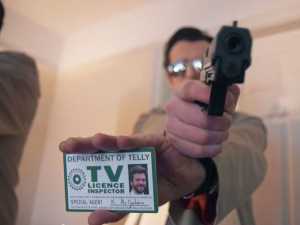
The Holy Trinity
 I grew up in the countryside, in a typical Irish village; one pub, one chipper, a church and a national school. It was quiet without being remote, not a ‘back of beyond, arse-end of nowhere’ type place, where the nearest neighbour lives nine fields yonder west and the postman has to dig his way to the house, but idyllic in its own way.
I grew up in the countryside, in a typical Irish village; one pub, one chipper, a church and a national school. It was quiet without being remote, not a ‘back of beyond, arse-end of nowhere’ type place, where the nearest neighbour lives nine fields yonder west and the postman has to dig his way to the house, but idyllic in its own way.
Naturally enough, I couldn’t wait to get out of there, to move to a city and escape the dreary mundanity of life in the sticks. And I did that, I’ve done that, I’ve been living in cities for the past ten years, availing of the amenities, surrendering myself to the nightlife, to the buzz, the vibe, the clamour and the noise; the deafening, incessant noise, the traffic, the people, the ambulances, the wailing sirens, the noise; ever-present, all-encompassing, never ending.
Now, when I return to that quiet, idyllic place called home, I welcome the silence, I enjoy the languor. I like going for a walk at night knowing that I probably won’t meet another soul. I like having a full, uninterrupted night’s sleep, the street noise and clamour replaced by the distant barking of a faraway dog. I like being able to hear myself think. After the hubbub of the city, the solitude and isolation comes as a relief.
The Wi-Fi is awful though.
There’s always been a pronounced divide between urban and rural life in this country, or, to be more precise, between those who live within the metropolitan district of Dublin and those who don’t. Things are different up there, and markedly so. There’s the obvious economic differences; higher wages, higher rents, more expensive pints, but even placing those obvious factors aside, our capital has more in common with other major cities in Western Europe than it does with the rest of this country.
Despite this imbalance those on the outside, the culchies, have been getting along fine, making a living without ever having to leave the bog, the mudheap, that little hut on the side of the mountain the jackeens call Galway.
And we probably could have lived like this forever, blissfully unaware of each other’s existence, were it not for the modernisation of our economy and our meteoric rise from paupers of Europe to confident, sophisticated forward-thinkers, world-leaders in technology, first name on the list for big-brand foreign investors and all-round clever bunch.

Meanwhile, as more and more people gravitate towards these heartlands, the rest of the country suffers. Those on the very margins of society, the people from villages like the one I grew up in, are ignored. With small farms and local businesses no longer sustainable, these people are left with two choices: move to where all the action is, or stay put and decay like the land which surrounds them.
And now, already cut adrift, these people are facing up to a future without the very pillars upon which their communities have been built.
It started with the post offices, and the announcement that up to 200 branches of An Post were to be shut over the next four years, all small offices in remote locations, all relied heavily upon by those living in the area. The state-owned provider of postal services had to tighten its belt and the first, obvious way to cut its losses was to eliminate the least profitable services.
Next came RTÉ, announcing that it was to offer voluntary redundancy to a tenth of its workforce (approximately 200 jobs) and sell off some land to ensure its own future. In addition, the state-owned broadcaster revealed plans to chase non-license payers with even more ferocity, threatening to hire the Navy Seals, Chuck Norris and the A-Team in an effort to ensure we all paid for the privilege of watching Ryan Tubridy interview Julian Clary of a Friday night.
Having been informed that B.A and the gang had long since retired, they changed tack. First came the sweet-talk, Director General, Dee Forbes, telling us that a license to watch First Dates Ireland was worth twice the price we currently pay. When we’d all stopped laughing, Communications Minister, David Naughten, mooted the revival of an initiative that I, for one, had completely forgotten about. Instead of setting out a viable plan to recoup the €40m lost every year due to unpaid licences, Minister Naughten wanted to target the people who don’t even have televisions.

But those in the hinterlands could probably live without An Post and RTÉ. Public transport, though? That’s not something which can easily be replaced.
At the time of the writing the Bus Eireann strike is in its fifth day. The effect for people living in cities, people like me, has been minimal; it’s been an inconvenience, rather bothersome to say the least. But for those living in villages and beyond, those who rely on the bus for their livelihood, for their education, for transport to and from important hospital appointments? For those people, it’s been nothing short of catastrophic.
Bus Eireann, just like An Post, and just like RTÉ, is state-owned and state funded. Like its stablemates, it operates without the constraints imposed on its competitors, using taxpayer’s money to monopolise its sectors and dominate its rivals. Yet, despite this head start, despite having first dibs on all the best routes and an army of vehicles the envy of its competitors, our national, state-owned, bus service provider is now seriously in danger, facing losses of €500,000 for each day of its strike.

It should come as no surprise that this triumvirate of Irish institutions are facing the wall. This is what happens when organisations are run without any real accountability; complacency sets in, best practises are ignored and a sense of entitlement permeates throughout. It’s not the fault of those currently on strike, ordinary workers who, having been backed into a corner, feel they have no other option. They’re merely a product of the system, a system which has failed to do the one job it was tasked with: provide a public service.
Sadly, these strikes, closures and lay-offs will hurt our most vulnerable. They will deepen the divide, widen it and isolate those on the fringes of society. However, despite all this doom and gloom, I believe, in the long run, we’ll be better off without our Holy Trinity. All three should be consigned to history, razed to the ground and, in their stead, let public services worthy of the name rise up to replace them.
How was it for you?

Tasked with discovering the single most unattractive thing men can do during sex, the researchers found that farty, sock-wearers were perfectly fine so long as they remained humble about their performance in the bedroom.
Bragging about their sexual prowess, and patting themselves on the back for pleasuring their significant other, was considered a massive turn-off among the women questioned; the feeling being that these conceited men were taking ownership of their lady’s orgasms.
Well excuse us for being so bloody generous! Previously the complaint was that we were too selfish, too caught up in our own needs, not paying enough attention to what women want. So off we went, educating ourselves, spending hours looking at pictures of clitorises, training our Neanderthal brains to enjoy foreplay, and what happens? We get grief for being too good at sex.
This is proof, if it were ever needed, that you just can’t please women, no matter what you do.










